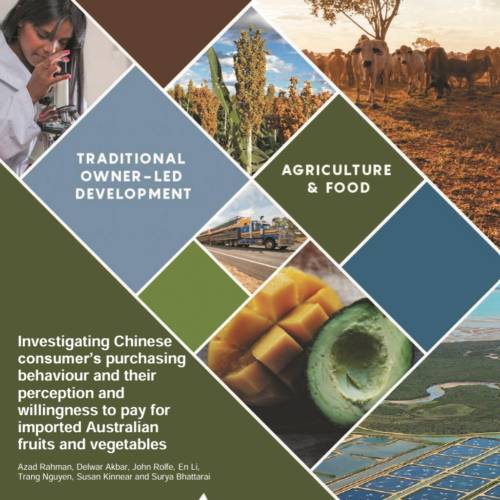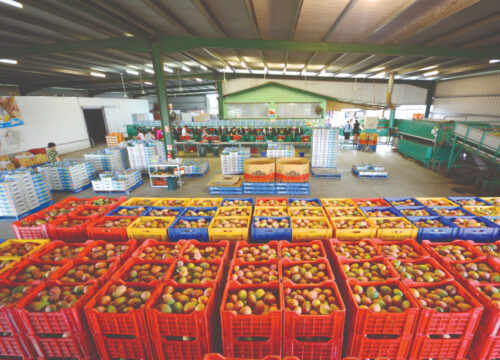
- Author Rahman, A., Akbar, D., Rolfe, J., Li, E. Nguyen, T., Kinnear, S., and Bhattarai, S
- Publish date 20 December 2021
- Type Report
- ISBN 978-1-922437-29-7
- Documents
- Agriculture
- Horticulture
Summary
The booming economy and the rise of the Chinese middle class make China one of the largest markets for agricultural produces. Australia exports several agricultural commodities to China, including fresh fruits and vegetables. With the growing demand for fresh fruits and vegetables in China, it is imperative to understand Chinese consumers’ preference and perception of imported fruits and vegetables.
There are a number of factors associated with consumers’ purchasing behaviour, especially in relation to food products. These include socio-economic factors of consumers, biophysical properties of food, price, brand, label, country of origin, and packaging, etc. At present, consumers’ environmental awareness has changed the pattern of their purchasing behaviour and made them more inclined towards organic and environmentally friendly products. There have been even more concerns about the environmental footprint for perishable agricultural products such as fresh fruits and vegetables. The increasing demand for high-quality fresh fruits and vegetables in the global market opens opportunities for fresh fruits- and vegetables-exporting countries.
The research aims of this study are twofold, the first is to explore, through a literature review, factors affecting Chinese consumers’ perceptions about purchasing imported horticultural products. The second is to investigate Chinese consumers’ perception and their purchasing intention towards imported Australian fresh fruits and vegetables.
Some of the key findings of the study suggest that:
- The Chinese consumers frequently purchased fruits and vegetables, and on average, they purchased about 2 kg of fruits and vegetables in a single shopping trip
- The average income of the participants was about ¥ 233,000 per annum. The average expenditure on fruits and vegetables per week was ¥ 206, as revealed in this study
- The Chinese consumers who had better attitudes towards imported fresh fruits and vegetables were more likely to purchase Australian produces
- The image of Australian produces led to higher consumer satisfaction and motivated their willingness to buy.
This report makes the following recommendations:
- Australian producers need to understand the quality required to export fresh produces to China. Failing to meet the quality requirements may have severe consequences as the quality expectation for Australian produces is very high.
- Environment concern has a moderate effect on consumer purchase decision, while food safety label has less appeal to consumers. Producers should adopt environment-friendly production strategies and procedure to reach more Chinese consumers.
- The results indicate the high demand for fruits and vegetables among Chinese consumers in the 13 provinces where the research participants of this study were from. Further research is needed to quantify the demand more accurately.
- Taste perception can be highly important among Chinese consumers, which leads to their purchase of imported fruits and vegetables. Producers should be aware of this and need to ensure that they deliver quality fresh produces with superior taste.
- Chinese consumers have a high willingness to pay premiums for fresh produces. It is indicated that Chinese consumers would pay a high premium for organic certified produces, but not for produces with a food safety label. Further research is needed to ascertain and quantify these findings.
Projects
Exporting perishable commodities to Asia: Developing a stakeholder collaboration model
Coordination through the supply chain between growers, processors, marketers and transporters is the main impediment to exporting perishable commodities to Asian markets. Developing strong ties with those Asian markets is critical for expansion and development of perishable commodities in Northern Australia. This project examined stakeholder collaboration in planning and investment for exporting high value perishable agricultural commodities (HVPACs) from Northern Australia to Asian markets. Exploration was undertaken of multi-party collaborations in producing and processing perishable commodities, developing and enabling supply chain infrastructure as well as identifying policy and regulatory barriers to investment in this sector. The research approach combined a literature review, two stakeholder workshops, a farmer survey in Queensland, a consumer choice survey in China and spatial-modelling for volumes of HVPACs in CQ region. The stakeholder workshops examined the types and processes of collaboration suitable for HVPACs with regard to processing, investment and international trade mechanisms. In addition, technological innovation or adaptation, appropriate logistics and supply chain management were also examined. The final summary report outlines the five key objectives set for the project and aims to summarise all the finding and strategic recommendations with end user guidelines based on recommendations. This framework will be applicable to all regions within Northern Australia. Conference papers (published) Australia New Zealand Regional Science Associations International (ANZRSAI ) 2019. Cairns, Queensland, Australia. Rahman, A., Akbar, D., Rolfe, J.(2019). Every community wants an airfreight facility: is this a viable regional agricultural supply chain development option for central Queensland in Australia? Akbar, D., Rahman, A., Rolfe, J., Kinnear, S., Schrobback, P., Bhattarari, S. (2019). Working to grow together: horizontal collaboration for horticulture production in Queensland.


